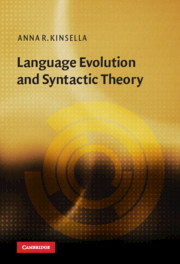Book contents
- Frontmatter
- Contents
- List of figures
- List of tables
- Preface
- List of abbreviations
- 1 Constraining our theory of language
- 2 Language as a perfect system
- 3 Language as an evolvable system
- 4 Language as a recursive system
- 5 Language as a minimal system
- 6 Towards an evolvable theory of syntax
- Bibliography
- Index
5 - Language as a minimal system
Published online by Cambridge University Press: 30 September 2009
- Frontmatter
- Contents
- List of figures
- List of tables
- Preface
- List of abbreviations
- 1 Constraining our theory of language
- 2 Language as a perfect system
- 3 Language as an evolvable system
- 4 Language as a recursive system
- 5 Language as a minimal system
- 6 Towards an evolvable theory of syntax
- Bibliography
- Index
Summary
Introduction
The preceding chapters have sketched a picture of a theoretical viewpoint which stands in opposition to what we know of evolution. The minimalist language faculty has been argued to be implausible from an evolutionary perspective for a number of reasons. Motivated by the primary concern of developing a system which conforms to conditions of economy, the system of language that emerges from minimalist theorising is reduced, atomic, and simple. In turn, this simplicity forms the backbone of the perfection argument; as the system consists only of what is strictly necessary, it is the optimal solution to the problem of mapping between sound and meaning. However, perfection directly contradicts the evolutionary bias for redundant, uneconomical systems; the trend for evolution to meliorize. The simple minimalist system is furthermore evolutionarily improbable by virtue of it permitting only a saltational account; the usual gradual adaptive processes of evolution leading to greater complexity than minimalism admits. In other words, the minimalist language faculty is not evolvable.
The implication in the previous chapter is that the human language faculty must be more complex than a minimalist (or recursion-only) view suggests. The question to be addressed in this chapter is how minimal the minimalist language faculty actually is. That is, are there reasons to believe that the conceptual basis of the MP cannot be borne out empirically? In what follows, I will suggest that the program fails to convincingly delineate a system which is truly reduced, economic, non-redundant, or perfect. There remain in the system hidden complexities, extraneous operations, unmotivated stipulations, and phenomena whose current lack of explanation hints at further requisite complexification.
- Type
- Chapter
- Information
- Language Evolution and Syntactic Theory , pp. 160 - 184Publisher: Cambridge University PressPrint publication year: 2009

